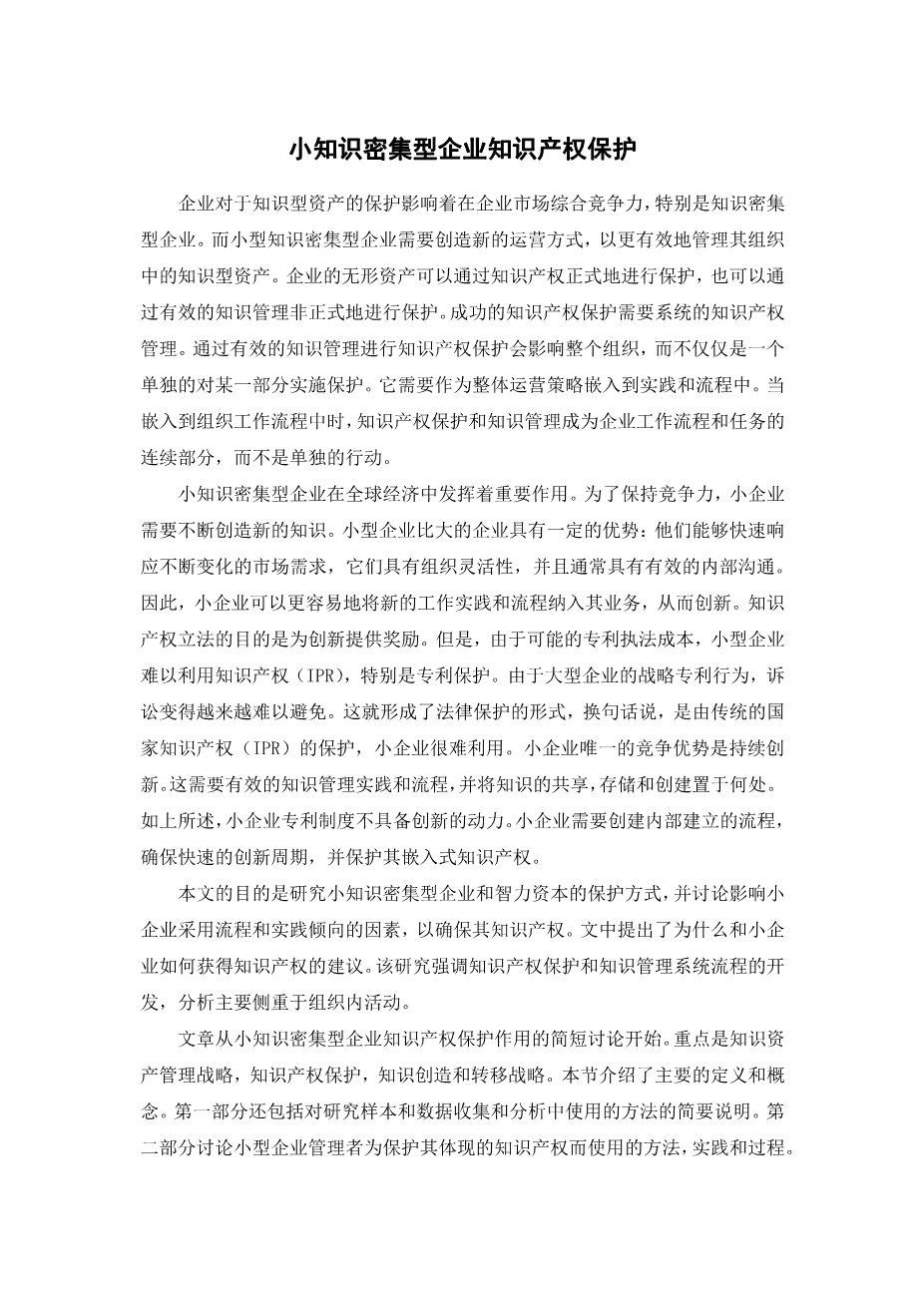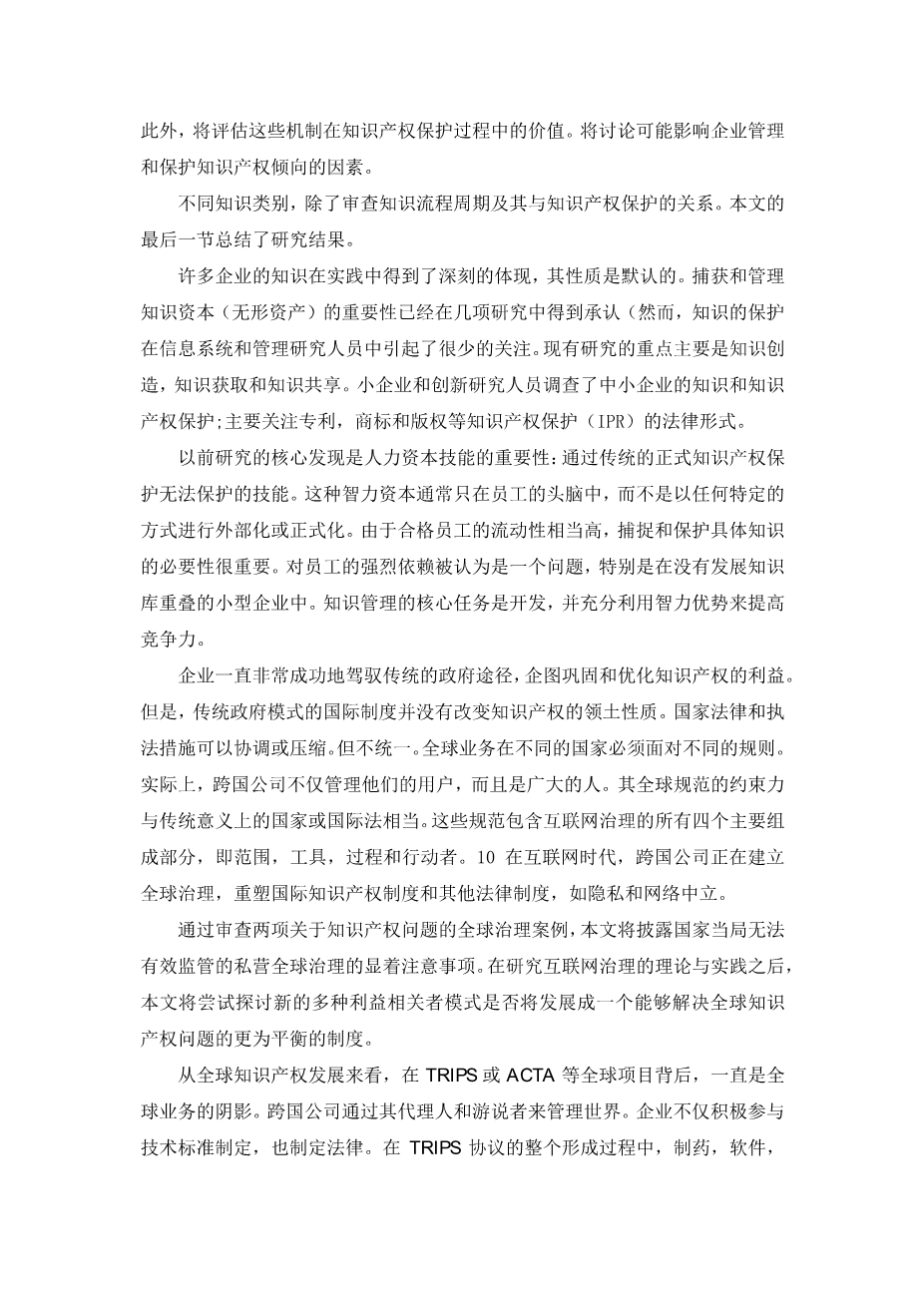Intellectual Property Protection in Small Knowledge Intensive Enterprises
ABSTRACT
Knowledge-based assets, intellectual property, and capital play a fundamental role in an enterprisersquo;s com-petitiveness, especially in small knowledge intensive enterprises. Small knowledge intensive enterprises need to create new ways of operating in order to manage the intellectual and knowledge-based assets in their organizations more efficiently. Organizational knowledge and intellectual property can be protected, either formally via IPR, or informally via efficient knowledge management. Successful IP protection requires systematic intellectual property and knowledge management. Intellectual property protection via efficient knowledge management affects the entire organization rather than being just a separate task. It needs to be embedded in organizational work routines, practices, and processes as an overall operational strategy. When embedded in organizational work processes, IP protection and knowledge management become a continuous part of work routines and tasks in the enterprise, not a separate action.
Keywords: Intellectual Property, Intellectual Property Protection, Knowledge Intensive Enterprise, Knowledge Protection, Knowledge Sharing, Knowledge Transfer, Small Enterprise
Behind global projects like TRIPS or ACTA, there has always been the shadow of global business. Multinational corporations have been governing the world through their agents and lobbyists. Businesses are actively involved in not only technological standard-setting but also law-making. Throughout the formation process of the TRIPS Agreement, pharmaceutical, software, music, movies and many other industries monitored the agenda-setting, negotiation content and final result, in order to secure their intellectual property interests. Nothing has changed since the times of ACTA. When the draft text of the agreement was kept secret from the public, the United States Trade Representative (USTR) stated that they had “consulted with an array of experts from various IP and tech industries”. 5 The trustworthy insiders, who had access to the draft were all from the leading businesses sectors and associations, including: Google, eBay, Sony, Time Warner, the Industry Trade Advisory Committee on Intellectual Property Rights, the Motion Picture Association of America, Inc. , the International Intellectual Property Alliance, the International Recording Industry Association of America, the Entertainment Software Association the Industry Trade Advisory Committee on Information and Communications Technologies, Services, the Software and Information Industry Association, Verizon Communications Inc., and others.
Businesses have been very successful navigating the traditional government avenues in an attempt to consolidate and optimize their intellectual property interests. However, the international regimes in traditional government models do not change the territorial nature of intellectual property right. National laws and enforcement measures can be coordinated or compressed. but not unified. A global business has to face different rules, in different countries.
Actually, multinationals are governing not only their subscribers, but people at large. The binding effect of their global norms is comparable to national or international laws in the traditional sense. These norms contain all four major components of Internet governance, namely: scope, instruments, process and actors. 10 In the era of the Internet, multinationals are setting up to global governance, to reshape the international intellectual property system and other legal systems, such as privacy and network neutrality.
Through the examination of two on-going global governance cases on intellectual property issues, this paper will disclose the conspicuous caveats of private global governance that cannot be effectively regulated by state authorities. After researching the theory and practices of Internet governance, this paper will attempt to explore whether the new multi-stakeholder model will develop into a more balanced regime that can address intellectual property issues globally.
Super multinationals have occupied the global market, but there is no globalized uniform legal system to meet their business need. The private global governance models on intellectual property, developed by businesses, concisely address this issue. Notwithstanding their contribution to economic development, multinationals are profit-driven organizations that care for investors/owners private interests. Global governance that merely caters to certain business models or intellectual property interests is likely to go against public interest by excluding competition, suffocating innovation and damaging the interest of consumers. The reality that the economy is globalized, but polity is still national, means that global multinationals are largely unregulated, particularly with respect to competition, consumer protection and intellectual property issues, and they will keep strengthening their power at the expense of public interests. The situation on the Internet is particularly serious, which is illustrated by the both Google Book Project and ICANNs intellectual property measures. Fortunately, instead of becoming a wild frontier that is solely subject to jungle rules, Internet governance is developing into a process of organizational innovation and mutual adaptation between society and technology around the world, in pursuit of the common objective of ensuring the openness and neutrality of the Internet
The WSIS principles may be briefly summarized by transparency, inclusiveness and coordination. 50 These principles provided, for the first time, a baseline set of tools that the international community could use to promote holistic and collective improvements in Internet governance.
剩余内容已隐藏,支付完成后下载完整资料


英语译文共 4 页,剩余内容已隐藏,支付完成后下载完整资料
资料编号:[484525],资料为PDF文档或Word文档,PDF文档可免费转换为Word
以上是毕业论文外文翻译,课题毕业论文、任务书、文献综述、开题报告、程序设计、图纸设计等资料可联系客服协助查找。


